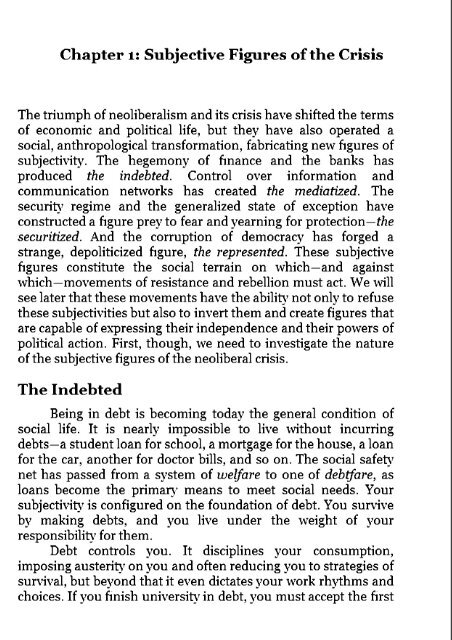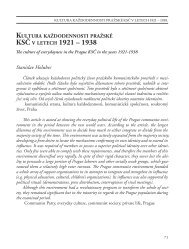Chapter 1: Subjective Figures of the Crisis ... - Negri in English
Chapter 1: Subjective Figures of the Crisis ... - Negri in English
Chapter 1: Subjective Figures of the Crisis ... - Negri in English
Create successful ePaper yourself
Turn your PDF publications into a flip-book with our unique Google optimized e-Paper software.
<strong>Chapter</strong> 1: <strong>Subjective</strong> <strong>Figures</strong> <strong>of</strong> <strong>the</strong> <strong>Crisis</strong><br />
The triumph <strong>of</strong> neoliberalism and its crisis have shifted <strong>the</strong> terms<br />
<strong>of</strong> economic and political life, but <strong>the</strong>y have also operated a<br />
social, anthropological transformation, fabricat<strong>in</strong>g new figures <strong>of</strong><br />
subjectivity. The hegemony <strong>of</strong> f<strong>in</strong>ance and <strong>the</strong> banks has<br />
produced <strong>the</strong> <strong>in</strong>debted. Control over <strong>in</strong>formation and<br />
communication networks has created <strong>the</strong> mediatized. The<br />
security regime and <strong>the</strong> generalized state <strong>of</strong> exception have<br />
constructed a figure prey to fear and yearn<strong>in</strong>g for protection—<strong>the</strong><br />
securitized. And <strong>the</strong> corruption <strong>of</strong> democracy has forged a<br />
strange, depoliticized figure, <strong>the</strong> represented. These subjective<br />
figures constitute <strong>the</strong> social terra<strong>in</strong> on which—and aga<strong>in</strong>st<br />
which—movements <strong>of</strong> resistance and rebellion must act. We will<br />
see later that <strong>the</strong>se movements have <strong>the</strong> ability not only to refuse<br />
<strong>the</strong>se subjectivities but also to <strong>in</strong>vert <strong>the</strong>m and create figures that<br />
are capable <strong>of</strong> express<strong>in</strong>g <strong>the</strong>ir <strong>in</strong>dependence and <strong>the</strong>ir powers <strong>of</strong><br />
political action. First, though, we need to <strong>in</strong>vestigate <strong>the</strong> nature<br />
<strong>of</strong> <strong>the</strong> subjective figures <strong>of</strong> <strong>the</strong> neoliberal crisis.<br />
The Indebted<br />
Be<strong>in</strong>g <strong>in</strong> debt is becom<strong>in</strong>g today <strong>the</strong> general condition <strong>of</strong><br />
social life. It is nearly impossible to live without <strong>in</strong>curr<strong>in</strong>g<br />
debts—a student loan for school, a mortgage for <strong>the</strong> house, a loan<br />
for <strong>the</strong> car, ano<strong>the</strong>r for doctor bills, and so on. The social safety<br />
net has passed from a system <strong>of</strong> welfare to one <strong>of</strong> debtfare, as<br />
loans become <strong>the</strong> primary' means to meet social needs. Your<br />
subjectivity is configured on <strong>the</strong> foundation <strong>of</strong> debt. You survive<br />
by mak<strong>in</strong>g debts, and you live under <strong>the</strong> w T eight <strong>of</strong> your<br />
responsibility for <strong>the</strong>m.<br />
Debt controls you. It discipl<strong>in</strong>es your consumption,<br />
impos<strong>in</strong>g austerity on you and <strong>of</strong>ten reduc<strong>in</strong>g you to strategies <strong>of</strong><br />
survival, but beyond that it even dictates your w T ork rhythms and<br />
choices. If you f<strong>in</strong>ish university <strong>in</strong> debt, you must accept <strong>the</strong> first










